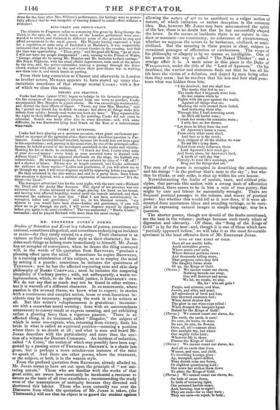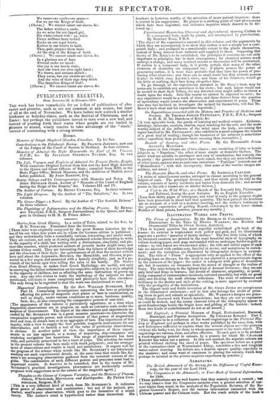MR. EBENEZER JONES'S POEMS.
Studies of Sensation and Event is a volume of poems, sometimes oc- casional, sometimes allegorical, and sometimes embodying an incident or scene—for they rarely extend to a story. Their character is as various as their subject, and their style as their character ; for be- sides such things as belong more immediately to himself, Mr. JONES has no scruples of conveyance, when he deems the thing conveyed will, in the words of his quotation from REYNOLDS, "produce a pleasing effect upon the mind." Sometimes be copies BROWNING, in a cunning adumbration of his subject, so as to employ the mind by setting it a puzzle; sometimes he imitates the quaintness of TENNYSON; now he has the affected roystering tone and skin-deep philosophy of Essay Coarrwar.r.; anon he imitates the simpering simplicity of Cockney poetry ; with, not unfrequently, a warm vo- luptuousness, which, to do the world justice, is EBENEZER'S own. We do not say that as much may not be found in other writers; but it is warmth of a different character. In an auacreontic, where passion is the avowed theme, we know what to expect; in stories with a continuous and complex action, loose or even licentious in- cidents may be necessary, supposing the work is to be written at all. But this writer's voluptuousness is gratuitous; inconsist- ent with a somewhat moral seeming ; done with an uncoveredness unnecessary to convey result or express meaning, and yet exhibiting rather a gloating fancy than a vigorous passion. There is an affected thing, in its treatment, called " Zingalee," the subject of which is some sea-captain, who, returning from victory, finds his bride in what is called an equivocal position—meaning a position where there is no doubt at all ; and what is seen and heard Mr. 3cnins describes with the particularity and more than the unc- tion of a witness for Doctors Commons. An incident of seduction, called "A Crisis," the notion of which may possibly have been sug- gested by a passing scene of FREDEBIKA BREMER'S, is a shade less gross, but is perhaps a more mischievous instance of the taint we speak of. And there are other poems, where the treatment, or the subject, or both, is in the wanton style.
From the prefixed quotation from REYNOLDS, already alluded to, Mr. JONES seems to have set out upon the principle of "not imi- tating nature." Those who are familiar with the works of that great critic, are aware how constantly he inculcated a recourse to nature as the basis of all true excellence ; recommending the study even of the masterpieces of antiquity because they directed and shortened this labour. Those who even cursorily run over the Discourse from which the quotation of Mr. Jonas is taken, (the Thirteenth,) will see that its object is to guard the student against
allowing the nature of art to be sacrificed to a vulgar notion of nature, of which imitation or rather deception is the common
idea. But, however Mr. JONES may have misconceived the spirit
of the law, there is no doubt but that he has successfully obeyed the letter. In the scenes or incidents there is no nature in con.
duct or manners—no consistency, no coherence of circumstances, whether we suppose the actors to be barbarous, civilized, or semi- civilized. But the meaning in these poems is clear, subject to occasional passages of affectation or carelessness. The scope of
his philosophy or allegory is by no means so intelligible. One of
his poems in this way is called " The Naked Thinker"; and a strange affair it is. A main actor in this piece is the Duke of
WELLINGTON, under the title of the "Lord of Apswern." On his
deathbed, the warrior and statesman finds out that he has all his life been the victim of a delusion, and duped by men being other than they seem : but he resolves that his son and heir shall pene- trate what was hidden from him.
I die deceived; but one shall tear
The masks that lied to me : The lands that I bequeath mine heir, He but retains while he Fights with his eyes against the world, Against all things that are, Mocking the veils around them furled, And scattering them afar.
Through him I hurl detecting scorn At life's old harlot zone ; I crush her masks for centuries worn ; I strip her, on her throne.
"Let there be lifted from the roof Of Apswern's house a room, From every other room aloof, And bare as is the tomb; And, stripped of all the clothes we wear To aid life's lying show, Naked from every influence, there Lord Apswern's heir must go ; And there, alone, for Apswera's land, A tenth of each day war Fiercely, to rend life's seemings, and Drag out the things that are."
The rest of the poem is occupied in describing the unfortunate and his doings " in the parlour that's next to the sky " ; but whe- ther he thinks, or only sulks, is shut up within his own bosom.
Notwithstanding the faults of morals, taste, and critical prin- ciples, that pervade this author, with a strong dash of affectation superadded, there seems to be in him a vein of true poetry, that might by care and labour be successfully wrought. There are frequent poetical passages in the volume, and traces of poetical power : but whether this would tell as it now does, if it were ab- stracted from uncommon ideas and sounding verbiage, to be occu- pied in expressing natural images in simple language, may be a question.
The shorter poems, though not devoid of the faults mentioned, are the best in the volume ; perhaps because such rarely admit of digression and obscurity. Of these, the "Song of the Kings of Gold" is by far the best ; and, though it is one of those which have "partially appeared before," we will take it as the most favourable specimen in the least offensive form of Mr. EBENEZER JONES.
SONG OF THE RINGS OF GOLD.
Ours all are marble halls,
Amid untrodden groves, Where music ever calls, Where faintest perfume roves ; And thousands toiling moan, That gorgeous robes may fold The haughty forms alone Of us, the Kings of Gold.
(Chorus.) We cannot count our slaves,
Nothing bounds our sway, Our will destroys and saves, We let, we create, we slay. Ha, ha! who are gods ?
Purple, and crimson, and blue, Jewels, and silks, and pearl, AU splendours of form and hue, Our charmed existence furl ; When dared shadow dim The glow in our wine-cups rolled ! When drooped the banquet-hymn Raised for the Kings of Gold!
(Chorus.) We cannot count our slaves, &c.
The earth, the earth, is ours!
Its corn, its fruits, its wine, Its sun, its rain, its flowers, Ours, all, all !—.cannot shine One sunlight ray, but where Our mighty titles hold; Wherever life is, there Possess the Kings of Gold!
(Chorus.) We cannot count our slaves, &c.
And all on earth that lives, Woman, and man, and child, Us trembling homage gives : Ay, trampled, sport-defiled, None dareth raise one frown, Or slightest questioning hold Our scorn but strikes them down To adore the Kings of Gold.
(Chorus.) We cannot count our slaves, &c.
On beds of azure down, In halls of torturing light, Our poisoned harlots moan, And, burning, toss to sight! They are ours—for us they burn ;
They are ours—to reject, to hold ; We taste—we exult—we spurn—
For we are the Kings of Gold.
(Chorus.) We cannot count our slaves, &c.
The father writhes a smile, As we seize his red-lipped girl, His a hite-loined wife : ay, while Fierce millions burn to hurl Rocks on our regal brows, Knives in our hearts to hold, They, pale, prepare them bows At the step of the Kings of Gold.
(Chorus.) We cannot count our slaves, &c.
In a glorious sea of hate Eternal rocks we stand : Our joy is our lonely state, And our trust our own right hand ; We frown, and nations shrink ; They curse, but our swords are old; And the wine of their rage deep drink The dauntless Kings of Gobi.
(Chorus.) We cannot count our slaves, Stc.



























 Previous page
Previous page